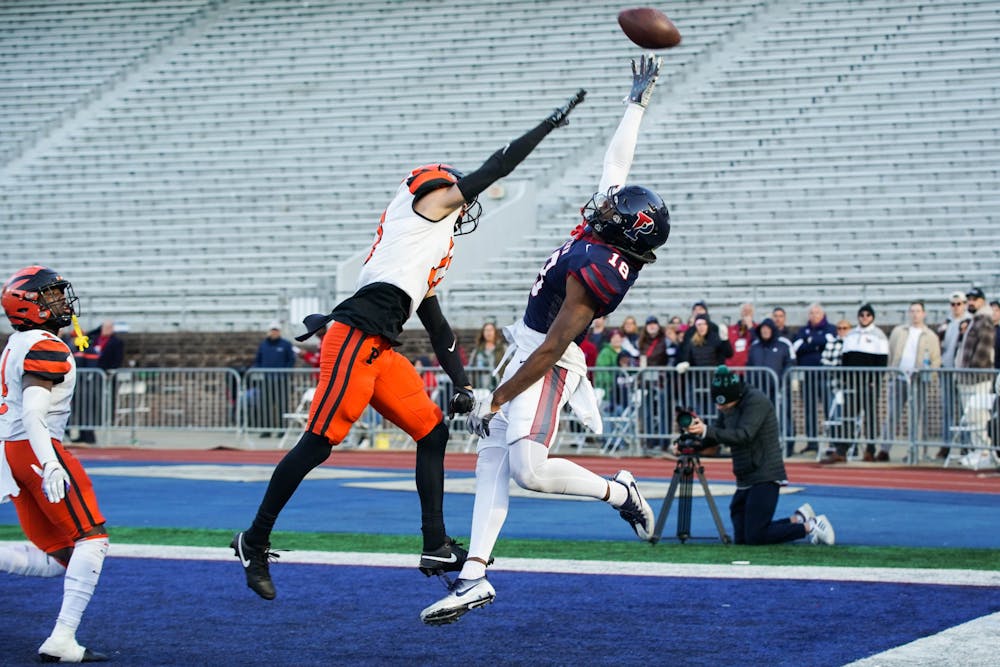For Penn football, 2023 has been a year of wasted potential. And on Saturday, the Quakers' self-inflicted wounds finally put the nail in the coffin for a season that has long been awaiting a hammer.
In the final game of the season, the Quakers (6-4, 3-4 Ivy) fell to rival Princeton (5-5, 4-3) 31-24 in a defeat that epitomized many of the Red and Blue’s struggles throughout this campaign. Despite out-gaining the Tigers by over 200 yards, Penn’s seven turnovers — their most in a game in over five years — ultimately proved fatal, ending the season on a fitting yet sour note.
“We didn’t give ourselves a chance,” coach Ray Priore said. “This thing was a dream from the statistical data, except for what I argue is the number one statistic in terms of scoring points: turnovers. Turnovers take everything away … so what do you say? I don’t know.”
With the loss, the Quakers finish the season 6-4, with all four defeats coming against Ivy League opponents. And while the record tells the story of a mediocre team, those four losses came by a combined margin of just 16 points. Each contest was well within reach for the Red and Blue, but poorly-timed errors doomed each game, and in the end, the season as a whole.
Penn appeared to be in control early on Saturday thanks to another excellent game from sophomore wide receiver Jared Richardson. A relative unknown before the season, Richardson broke out as the Quakers' leading receiver, finishing the year with 67 catches for 788 yards. And it was Richardson that broke open the scoring for the day, finding the endzone after a clean post route left him wide open for junior quarterback Aidan Sayin.
But it was not all sunshine for Penn’s newest star wideout. During the second quarter, Richardson was responsible for the Quakers’ first turnover, bobbling a goal line pass directly into the hands of a Tiger defensive back.
“I could have done a better job,” Richardson said. “I have to work on the little things, I had drops. You know, as the wide receiver one, if the ball’s in my hands, I have to come up with it.”
On the next drive, another critical drop from Richardson on third down set the Tigers up with great field position, which they capitalized on with a 59-yard march to the end zone that gave them a 10-7 halftime lead.
RELATED:
Asif | Aidan Sayin may not be the answer for the Quakers
Penn football falls to Harvard 25-23 following triple-overtime thriller
On the first possession of the second half, Richardson redeemed his early struggles by taking a screen pass from Sayin 59 yards for a touchdown, bolting down the sideline and outrunning the only Tiger defender within reach.
But it was then, with a century-old rivalry on the line, that Penn’s offense came off the rails. In the seven drives following Richardson’s touchdown, the Quakers committed an unfathomable five turnovers, providing a brutal example of the poor ball security that also cost Penn home games against Dartmouth and Brown.
“Sometimes there are self-inflicted wounds and it’s your problem, your cause,” Priore said. “Sometimes your opponent does some really good things. You go back to the Dartmouth game … to the Brown game … football is a game of inches. Today, I just couldn’t figure out a couple of the plays.”
And yet, despite such a sloppy effort, the Red and Blue had their chances — as they have all season long — to emerge with a win. With 44 seconds to go, Sayin again found Richardson in the end zone, his third touchdown drawing the Quakers within one score. And after a perfect bounce on the ensuing onside kick from senior kicker Graham Gotlieb, Penn had one final chance to complete a miraculous comeback effort.
But such a day for the Red and Blue could only have ended one way: a turnover. With 18 seconds to go, Sayin fired a pass deep to Richardson, but was picked off by Tigers defensive back Nasir Hill. It was Sayin’s fourth interception and sixth turnover overall.
While a single storyline seldom defines a season, struggles taking care of the ball have continually plagued Penn. The Quakers committed a total of 14 turnovers over their four Ivy League losses compared to just two in their three conference wins.
“We just weren’t able to play a consistent game all the time,” Priore said. “You try to pinpoint why that was the case. I’m not sure if I have a good reason for it right now.”
There are many potential answers to the mystery of Penn football’s struggle this year. But regardless of where you place the blame, 2023 will go down as a season the Quakers gave away.









